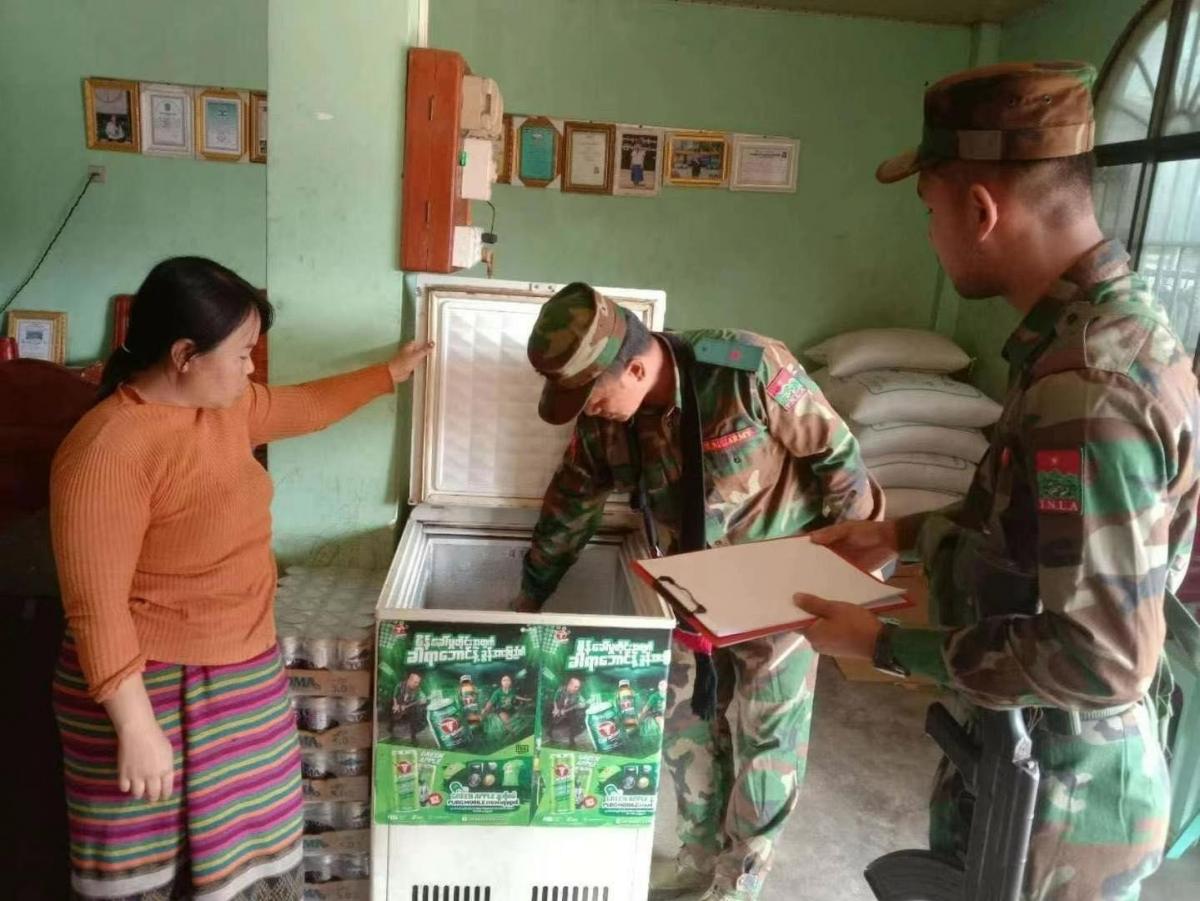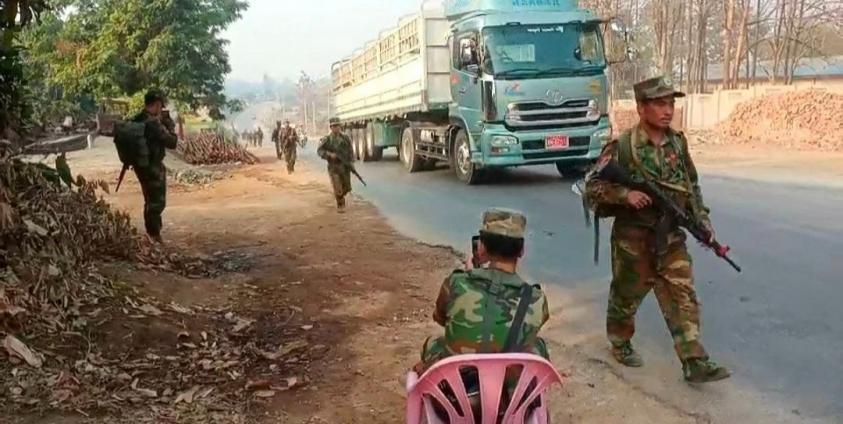Nang Noung Noung — While some soldiers sat on the chairs beneath the trees, others were observed marching towards the town in full military attire.
This is the scene that people in Northern Shan State, especially of Lashio town, where the North-Eastern Command is based, are accustomed to seeing lately.
The image was snapped on May 14, 2023, when Ta'ang National Liberation Army (TNLA) troops marched on Lashio town.
Rarely do TNLA soldiers enter a civilian area like Lashio town while fully equipped and in military uniform.
Likewise, during the early morning hours of May 11 at 4 A.M., TNLA soldiers arrived near Lashio town and allegedly enlisted not only Taáng but also Shan men.
"The TNLA members have never gone this deep into the town before. However, it raises some thoughts as they are now able to do so. Despite the efforts of many civilians and families moving to the town to escape recruitment, it is troubling that they still managed to reach the town for recruitment," expressed a young Taáng man who sought refuge in Lashio town to avoid being recruited.
Every ethnic armed group has a policy that each male of that ethnicity who reaches the required age must serve in the armed forces. Due to their family's financial circumstances, many young people are not interested in serving or joining the armed organization; others even migrated to an urban region to evade recruiting. Since 2016, when conflict between the two Ethnic Armed/Revolutionary Organizations (EA/ROs), the RCSS/SSA and the TNLA, broke out in the Northern-Shan, Kyaukme area, the majority of young people have fled to Lashio town like Lashio.
"I was informed that the recruitment has also reached Lashio town. As for recruitment, we would carry out in the area that we are active. We have a policy that every man who reaches the required age is to serve in the organization. When we recruit, we only recruit Taáng men, and not those who are not," stated TNLA spokesperson Major Ta Aike Kyaw to Shan Herald.
The Shan North region contains the economic zone that borders China and is the route of the Shwe Gas pipeline that runs from Myanmar to China.
Along those routes, there are numerous EROs operating, including militia organizations controlled by the SAC.
After the military takeover in 2021, newly formed armed groups like the People Defense Forces have also grown in number in Shan State, which is home to one of the largest numbers of armed groups.
After the coup, the TNLA's strength increased to the point where they were able to move into the towns of Lashio and Namkham.
"The TNLA entered Namkham's main market armed on two consecutive days, and there were instances of gunfire. These actions, along with the imposition of levies on the people, have become burdensome for the residents. Especially, people feel insecure, and feel like we do not know who to rely on," said a Namkham resident who goes by the
name Sai Saw (not his real name), after the TNLA forces also reached Namkham.
According to several locals, military bases and police stations are said to exist along the road used by TNLA soldiers to reach Namkham town.
Despite the presence of these military outposts and police stations, the TNLA managed to enter Namkham town fully armed without encountering any interference.
Namkham and Muse Township are located in the Shweli River Basin, commonly known as the Htung Mao region, and are positioned along an important commercial route connecting China and Myanmar. Periodically, the TNLA enforces taxes on the main roads and local residents in these areas. Additionally, they occasionally seek shelter in people's houses, including IDP (Internally Displaced Persons) camps.
"Previously, taxes were only collected once a year," remarked Sai Pha. "However, following the military coup, they not only began collecting taxes in the town, villages, and on the main road, but they also went as far as gathering rice in the IDP camps, like those in Mong Wee."
 "The Palaung State Liberation Front/Taáng National Liberation Army (PSLF/TNLA) was founded in 2011 by Taáng young people, one of whom is Brigadier General Ta Bhone Kyaw, and has managed to sustain itself ever since."
"The Palaung State Liberation Front/Taáng National Liberation Army (PSLF/TNLA) was founded in 2011 by Taáng young people, one of whom is Brigadier General Ta Bhone Kyaw, and has managed to sustain itself ever since."
Currently, the TNLA is non-signatory to Nationwide Ceasefire Agreement (NCA) with the military council and has consistently declined the military council's invitations to various talks and meetings.
Following the coup, the TNLA, primarily led by young individuals, has been involved in approximately 15 armed clashes with the State Administration Council (SAC) military council. And they have engaged in around 429 armed clashes with the RCSS/SSA.
In 2022, according to the TNLA press release, there were 28 clashes with the RCSS and only 6 clashes with the SAC regime.
Hence, in Northern Shan, there are more inter-ethnic armed conflicts or clashes among Ethnic Armed Organizations (EROs) than there are armed clashes with the State Administration Council (SAC) regime.
Within this year, there have been at least two meetings between the Chinese special envoy to Myanmar and the Northern Alliance Group, of which the TNLA is a member. The Chinese side has urged these groups to abstain from engaging in armed clashes with the State Administration Council (SAC) and instead encouraged them to prioritize dialogue and negotiations.
"There seems to be a notable trend where China has been urging the members of the FPNCC (Federal Political Negotiation and Consultative Committee) not to launch attacks on the State Administration Council (SAC) council," U Than Soe Naing, a political analyst, stated.
U Than Soe Naing continued that due to the PSLF/TNLA's active presence along the border with China, it becomes crucial for them to maintain a positive relationship with China. Consequently, they need to exercise caution when it comes to engaging in armed clashes with the SAC. By reducing armed confrontations, it also allows them to create a conducive environment for building and reinforcing their own strength.
"It is a normal trend to expect that there will be less fighting and clashes on one side, but an increase in taxation and recruitment from EROs on the other," U Than Soe Naing said." If there are no military confrontations, these regular trends can be predicted." The PSLF/TNLA has a political goal, which they have increasingly emphasized and become more outspoken about, which is the acquisition of Taáng State.
However, the current situation on the ground has presented challenges for the TNLA. They find themselves in a delicate position of needing to maintain a good relationship with China, which limits their ability to engage in armed clashes with the State Administration Council (SAC). Consequently, they are unable to expand their control area as they would have desired. U Than Soe Naing further remarks that there are still limitations for the TNLA to fully achieve their territorial aspirations.
Thomas Kean, a senior consultant on political and conflict issues at the International Crisis Group (ICG), asserts that the Spring Revolution is significantly dependent on the positions and outlook of Ethnic Armed Organizations (EROs).
"This is evident in the case of the TNLA," added Thomas Kean. "The public has shown their full support for the organization. However, they still need to take into account China's perspective and reaction, which compels them to exercise caution in their involvement with the anti-coup movement. Organizations in such a position, being neither fully aligned with the State Administration Council (SAC) nor closely engaged with the National Unity Government (NUG), but providing training to the spring resistance organizations, are worth being closely monitored."
U Than Soe Naing further highlighted that one of the reasons why China has urged parties like the TNLA to refrain from engaging in armed conflicts with the State Administration Council (SAC) is to safeguard the Myanmar-China trade routes.
He explained, "If there are armed clashes between the TNLA and the military council, it would put their economic interests at risk."
There are crucial trade and economic connections such as the China-Myanmar oil and gas pipelines and the Muse-Mandalay road. The negative impact on these commercial routes could strain the relationship between China and a group like the TNLA, which relies on China for various reasons. Therefore, maintaining mutual understanding is essential, as emphasized by U Than Soe Naing.
According to several analysts, if the TNLA were to align themselves with revolutionary groups such as the NUG/PDF and engage in military attacks against the State Administration Council (SAC) regime, they might achieve military advantages. However, this strategy could potentially strain their relationship with China, thus it opts to remain cautious.
Despite the decrease in armed clashes in Northern Shan State, the people of Shan State are experiencing the burdens of increased recruitment and taxation.
In the midst of difficult times, the people of Northern Shan State continue to be affected by armed clashes between EROs. Instead of uniting against the common enemy, these EROs are engaged in conflicts with each other. This situation not only hampers the progress of their political and military goals but also places additional burdens on the civilian population.
"Because Northern Shan has a large number of different ethnic armed organizations, we have to collaborate with one another based on understanding. Only then will our people suffer less and enjoy peace. Our organization is strictly following our policy,"stated Ta Aik Kyaw.
On the other hand, the sight of TNLA troops marching in full uniform, even in urban areas, and conducting recruitments within the city has raised concerns and worries, particularly among individuals who are not Taáng.







